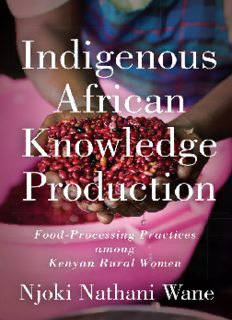
Indigenous African Knowledge Production: Food-Processing Practices among Kenyan Rural Women PDF
Preview Indigenous African Knowledge Production: Food-Processing Practices among Kenyan Rural Women
INDIGENOUS AFRICAN KNOWLEDGE PRODUCTION Food-Processing Practices among Kenyan Rural Women This page intentionally left blank NJOKI NATHANI WANE Indigenous African Knowledge Production Food-Processing Practices among Kenyan Rural Women UNIVERSITY OF TORONTO PRESS Toronto Buffalo London © University of Toronto Press 2014 Toronto Buffalo London www.utppublishing.com Printed in Canada ISBN 978-1-4426-4814-2 Printed on acid-free, 100% post-consumer recycled paper with vegetable- based inks. Library and Archives Canada Cataloguing in Publication Wane, Njoki Nathani, author Indigenous African knowledge production : food-processing practices among Kenyan rural women/Njoki Nathani Wane. Includes bibliographical references and index. ISBN 978-1-4426-4814-2 (bound) 1. Embu (African people) – Science. 2. Embu (African people) – Folklore. 3. Embu (African people) – Social life and customs. 4. Women – Kenya – Embu District – Social life and customs. 5. Food industry and trade – Kenya – Embu District. I. Title. DT433-545-E48W35 2014 305.48′896391067626 C2014-900132-0 University of Toronto Press acknowledges the financial support of the Government of Canada through the Canada Book Fund for its publishing activities. University of Toronto Press acknowledges the financial assistance to its publishing program of the Canada Council for the Arts and the Ontario Arts Council. To Mom, Dad, Brother Anthony, Michael Lemiso, Francis, and Murtha. May your souls rest in peace. This page intentionally left blank Contents Foreword ix Acknowledgments xiii Map of Kenya xiv Introduction 3 1 Food Processing: Embu Women and Indigenous Knowledges 19 2 Kenya: The Land, the People, and the Socio-political Economy 31 3 The Everyday Experiences of Embu Women 44 4 Food Preservation and Change 63 5 Gender Relations, Decision Making, and Food Preferences 72 6 Indigenous Technology and the Influence of New Innovations 79 7 Removing the Margins: Including Indigenous Women’s Voices in Knowledge Production 87 8 Contesting Knowledge: Some Concluding Thoughts 98 Notes 107 References 113 Index 121 This page intentionally left blank Foreword Anyone who has visited rural communities in indigenous communities cannot escape the constant lament of their elders about the attempts of the current generation to dismiss or disempower indigenous ways of knowing as “irrelevant knowledge.” The elders’ defence of “indig- enous” or customary ways of doing things does not imply that local peoples want to live in the past or that they are only interested in glo- rifying or romanticizing the past for its own sake. Rather, it is an astute realization that knowledge is cumulative. Knowledge builds on itself, and only the anti-intellectual claims that some forms of knowledge are useless, without appreciating the contexts and politics of claiming and producing such knowledge. If there is “useless” knowledge, it is defined more by the poor intent of the user of such knowledge than by the knowledge per se. For indigenous or minority scholars in the academy it is a constant struggle to legitimize their cultural ways of knowing. Today we can point to another form of intellectual politics that calls on us to subvert dominance and to shift away from Euro- centric or Western-centric theorizing and discursive practices. Person- ally, I see indigenous knowledge as a strategic knowledge base from which to rupture the Western academy because I am convinced that indigenous, anti-colonial analysis offers the best hope to challenge the epistemic violence of Western cultural knowledge as it relates to the material and spiritual exigencies and existence of marginalized subjects and communities. Although the insistence upon the reimagining and repositioning of difference as critical political discourse draws strength from the important work of critical theorizing, I nevertheless want to insist further upon an anti-colonial agency that enunciates itself in the talk of “border crossing” and “cultural synthesis” by inserting power
Description: